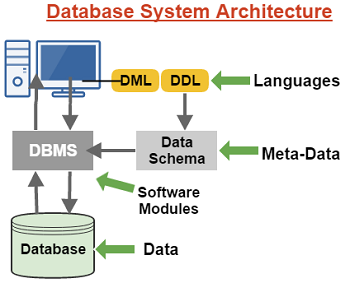What is a Database Management System? - Purpose and Function
What is DBMS?
DBMS stands for Database Management System. It is a software that allow a systems to perform some of the basics functions of the database. In other words we can say it is a software package which perform functions like store, manipulate, retrieve, and manage data in a database. It manipulates some of the components of data like data format, field names, record structures and file structures and manipulation of the data is done by some of the specified rules. Some of the Examples of DBMS: Microsoft access, MySQL, ORACLE, Microsoft SQL Server, Filemaker.
Learn more about DBMS and how such systems are collaborated with the fourth generations query languages from our online tutors. They were help you out to understand more about DBMS. Click here to get help in DBMS assignment.
Advantages of DBMS
DBMS has many different advantages over file processing systems or it also has its own standalone advantages. Improved data sharing: DBMS helps to create environment in which user have better option to access managed data and it is possible for end users to access more quickly and get response in environment , Improved data security: As the more user increase, the greater the risk of data security breaches. So DBMS use the framework for the better enforcement of data security and privacy, Better data integration: data is residing in the different sources to promotes an integrated view that give you a clear picture of the organized data which is become easier to access, Minimized data inconsistency: data inconsistency occur when the a person having two entries with the different name like Dennis Ritchie or Dr. Ritchie so DBMS reduce this by using proper designed database, improved decision making:

Purpose of DBMS
DBMS were developed to handle all the drawbacks of typical file-processing systems supported by conventional operating systems. Some of the purpose that attain by DBMS are Data redundancy and inconsistency, Difficulty in accessing data, Data isolation, Integrity problems, atomicity of updates, concurrent access by multiple users and security problems.
Functions of DBMS
Data Dictionary Management
This is one of the most important function of DBMS that stores definition of the data elements and their relationships in a data dictionary. Data dictionary is basically used to look up the required data component structures and relationships. If an owner will do any change in the database structure that automatically record in the data dictionary. So basically it provide data abstraction and remove structure and dependency from the system.
Data Storage Management
Recent DBMS provides storage of the data not only for the data but also for the related data like entry forms, report definition, data validation rules, procedural codes, and so on. Storage management is also important for database performance tuning which is relates to the activities that increase the storage and access speed. So this also play an important role in DBMS.
Data Transformation and Presentation
Data Transformation and Presentation determine the difference between physical and logical data formats means its format the physically retrieved data to make it comply with the user’s logical expectation. Lets take an example to understand it more clearly like different countries enter date in the enterprise data in different ways like England enter date like “Mar/02/2016” and same date would be entered by India like “02/03/2016”. So the despite of the data presentation format, the DBMS must manage the data in the proper format for each country.
Security Management
This is also another important function of DBMS which create the security system that fulfil user security and data privacy. By using security system you can determine which user can access the database and the data operation user can perform like read, add, delete, or modify. Which is important in multiuser database system when a same database access by multiple user and to track the record of each user. But to implement such security system tend to more costly.
Multi User Access Control
This function of the database management systems enables multiple user to access the same database simultaneously without affecting the integrity of the database. So the Data integrity and Data consistency are the basic of this function.
Backup and Recovery Management
To ensure the data safety and its integrity DBMS provide backup and data recovery. Modern DBMS system provide some of the special utilities that allow the Data administrator to perform routine and special backup and restore procedures. Recovery management basically deals with the recovery of the database after the failure.
Data Communication Interfaces
Modern generation of DBMS accept user request by a new intended way over different network environment. It provide access via Internet by using web browsers, and communication can be done by several different ways. By using Data communication methods can connect to the third party systems to distribute information via e-mail and automatically publish predefined reports on the websites.


